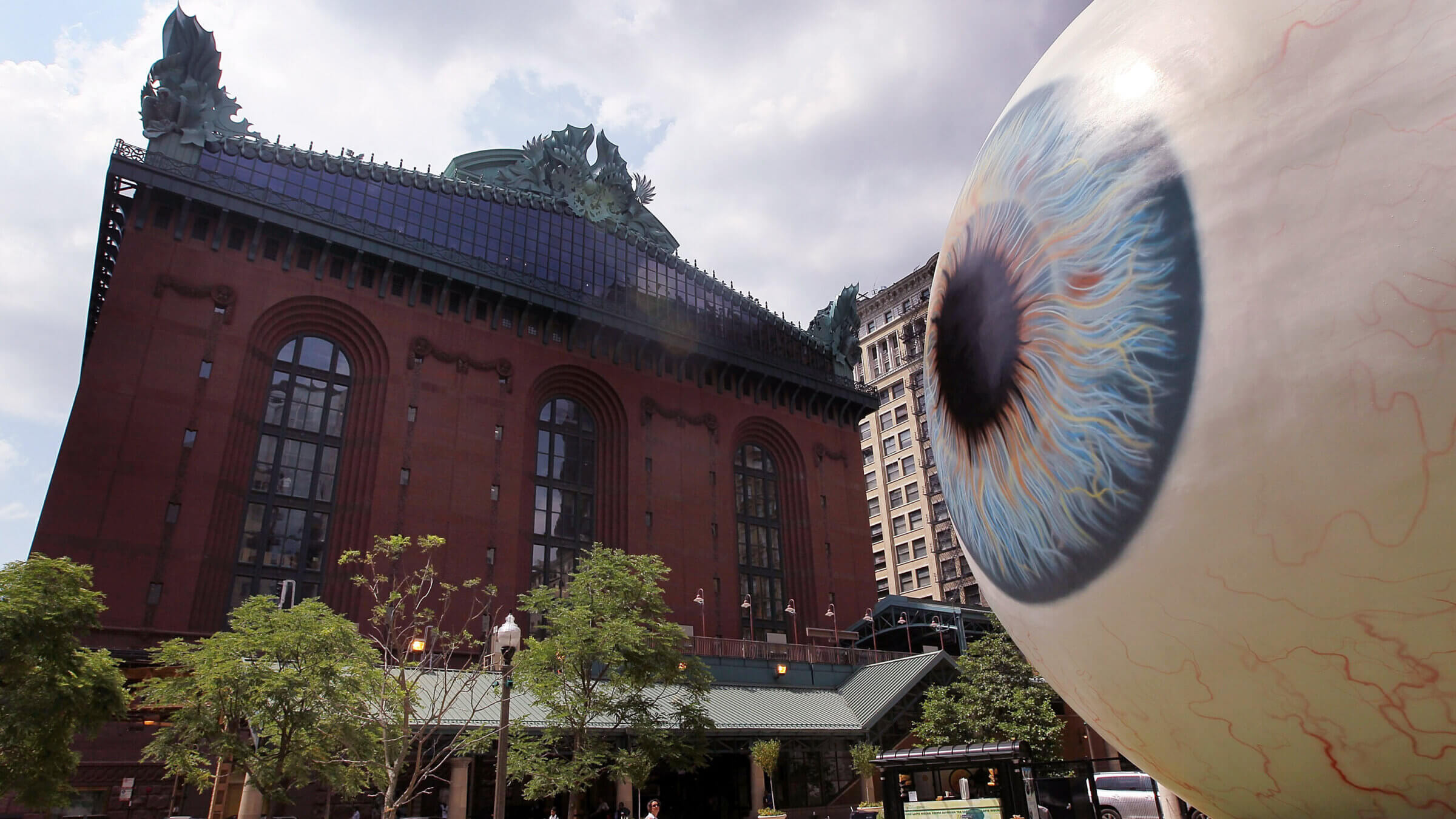Why Jews should pay close attention to book banning and bomb threats against libraries
Threats against libraries across America recall a harrowing antisemitic history

A 30-foot tall eyeball sculpture by artist Tony Tasset sits across from Chicago’s Harold Washington Library, which received a bomb threat on Sept. 11, 2023. Photo by Getty Images
Bomb threats against libraries have become a growing trend in the U.S., and the Jewish community should pay attention. Violent attacks on books are a sad and dangerous theme throughout Jewish history, and the escalation from book bans to threats of physical violence should not be ignored.
Several libraries in Chicago and the surrounding suburbs were closed yesterday due to called and emailed bomb threats.
According to the Chicago Sun-Times, the Chicago Police Department learned that “an employee at the Harold Washington Library Center, 400 S. State St.” — the flagship branch of the Chicago library system — “received an anonymous email saying that there was a bomb inside the building. A bomb squad and canine units did a sweep of the building, located in downtown Chicago, but did not find a bomb.
The Evanston, Addison, and Aurora public libraries, all in Illinois, also received threats. The threats “came as Illinois Secretary of State Alexi Giannoulias testified at a Senate hearing about the state’s first-in-the-nation ban against bans,” according to the Chicago Sun-Times.
But this isn’t just happening in Illinois. In late August, a bomb threat shut down the Iowa City Public Library. The Davis, California, library has received multiple threats. And in Forsyth County, Georgia, a young library volunteer made a bomb threat.
Fortunately, so far, all the threats have been just that — threats. But any actual act of violence at any library will make going to the library a lot less safe. And these threats, called or emailed in, shut down libraries for everyone, and should be viewed as the ultimate form of censorship.
Jewish books banned throughout history
Jewish books are the original banned books — from the medieval attacks on the Talmud to Nazi book burning.
On June 17, 1242, on the orders of both the pope and King Louis of France, all copies of the Talmud were burned. According to the Jewish Virtual Library, “24 wagon loads of books totaling thousands of volumes were handed to the executioner for public burning. Subsequently, the burning of the Talmud was repeatedly urged by the popes as well as various kings.”
The 24 cartloads included more than 12,000 books. Additional burnings took place in Toulouse, France, in 1319. In his manual for inquisitors, Bernard Gui specifically mentioned the great medieval commentators Rashi and David Kimḥi as well as Maimonides as writers whose work should be condemned.
According to PEN America, 1,648 books have been banned across the United States.
“Book-banning now is not about the book. It is intentional and willful discrimination, erasing people and their identities from our society,” Illinois State Senator Mike Simmons wrote in an op-ed explaining why he sponsored a bill to ban book banning.
As book bans spread and bomb threats against libraries increase, Jewish communities should also be aware that bomb threats against Jewish institutions are on the rise. The Anti-Defamation League recorded an increase from 8 bomb threats to 91 threats against Jewish institutions in 2022.
And it’s worth remembering that there is a long history of violence against Jewish books, and the people and places that own them.
Prior attacks on Jewish libraries
In 2015, The Times of Israel reported that the window at the Jewish library near Lyon, France, was smashed and a man shouted, “We’ll get all of you Jews,” before he mounted a scooter and was driven off by someone else.
In the Library of Congress, it’s possible to view centuries-old Jewish books with passages physically cut out by censors. As I have written in a previous article for the Forward, I was stunned to see prayer itself censored in the case of a 1486 edition of a prayer book.
An attack on libraries is an attack on books, but also an attack on history and truth. As Rosh Hashanah approaches, Jews should remember that the machzor itself was a victim of censorship.
Jewish history shows that attacking books and ideas leads to attacking people. It’s bad enough that threatening libraries is a trend, and that bomb threats against Jewish institutions are up more than 11-fold. Let’s raise awareness and make sure this situation doesn’t escalate further.
A message from our Publisher & CEO Rachel Fishman Feddersen

I hope you appreciated this article. Before you go, I’d like to ask you to please support the Forward’s award-winning, nonprofit journalism so that we can be prepared for whatever news 2025 brings.
At a time when other newsrooms are closing or cutting back, the Forward has removed its paywall and invested additional resources to report on the ground from Israel and around the U.S. on the impact of the war, rising antisemitism and polarized discourse.
Readers like you make it all possible. Support our work by becoming a Forward Member and connect with our journalism and your community.
— Rachel Fishman Feddersen, Publisher and CEO






























